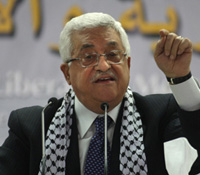|
Bethlehem:
Mahmoud Abbas, the Palestinian president, has told Fatah activists
that the Palestinian movement seeks peace with Israel, but that
"resistance" remains a right.
Abbas made his comments to more than 2,000 delegates at the opening
of Fatah's conference in Bethlehem,
a three-day meeting seen by many as an opportunity to reform and
rejuvenate the party.
"Although peace is our choice, we reserve the right to resistance,
legitimate under international law," Abbas said in his speech on
Tuesday.
"We will not stand helpless in the face of Israeli incursions."
Al Jazeera's Nour Odeh, reporting from outside the conference centre
in the West Bank town, said Abbas words were an attempt to appeal to
a movement divided over how it should proceed.
"The kind of heritage that Fatah carries is based on the fact that
it led armed resistance. It would have been very difficult to
conceive of Mahmoud Abbas disowning that legacy," she said.
"The division in Fatah is not only generational, it is also about
the tactics of the movement - where it must move forward, how it
must deal with Hamas and the division, and how it must deal with
Israel."
'Liberation' struggle
The Bethlehem meeting, the first party conference in two decades, is
expected to see Fatah tackle issues such as its ageing leadership
and revitalise the party, largely paralysed by political infighting.
But ahead of the conference, officials denied members would revise
the group's founding charter which, like that of its rival Hamas,
calls for Israel's destruction.
"It will remain as is. It won't be subject to discussion," Azzam
al-Ahmad, a senior Fatah leader, said.
The charter calls for armed struggle "until the Zionist entity is
wiped out and Palestine is liberated".
But a draft of Fatah's new programme calls for new forms of
resistance such as civil disobedience against the expansion of
Jewish settlements and the separation barrier, which Israel says is
for security, but which Palestinians denounce as a land grab.
The peace talks with Israel have been stalled for months, Fatah is
backed by the West largely because of its willingness to negotiate
with Israel.
'Security and peace'
The Fatah conference suffered a blow even before it began, with Hamas,
which effectively rules the Gaza Strip, refusing to allow 400 Fatah
delegates based in Gaza to attend unless Fatah releases hundreds of
Hamas activists detained in the West Bank.
Zoughbi Zoughbi, a long-time Fatah member and activist, called the
conference a "historical moment" none the less.
"Despite of all of that, I feel there is a message to convey to the
whole world, that the Palestinian people are dedicated to the peace
process," he said.
"Despite all the awkwardness and despite all the Israeli politics
and policies in the occupied territories."
The conference also aims to elect a new central committee and a
ruling council, in the hopes of giving more of a say to a younger
generation that grew up fighting Israel's occupation of the West
Bank.
The last Fatah congress was held in Tunis in 1989, when the movement
was under the leadership of Yasser Arafat, the late Palestinian
leader.
|






 I
I
